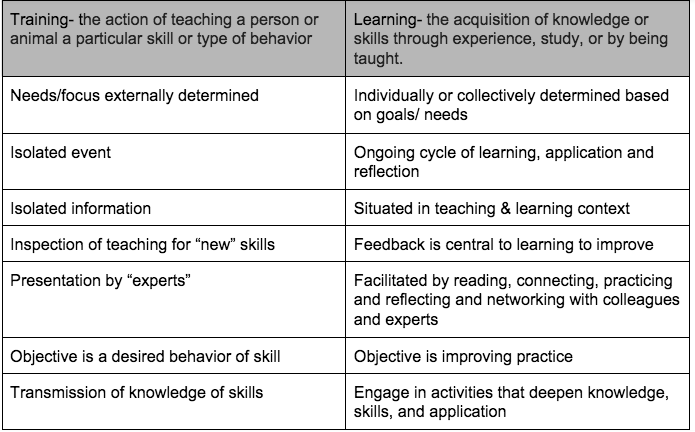I always cringe at the use of training when describing working with teachers and leaders. As many people would agree training seems to be what one does to people (or dogs) as opposed to learning, which is developing knowledge through authentic and relevant experience.
Towards the end of the year I was working with a school leadership team to design their professional learning plan for the following year. After observing teachers and discussing the current state of learning, and then determining strengths and goals for the school, we prioritized needs and how teachers would learn to create the desired learning environments. When it came time to develop the professional learning plan and we talked about teachers owning this work I was met with blank stares. One teacher questioned, “So, are we just going to take turns being in charge and pretending we’re experts? I feel really uncomfortable with this”. Based on the looks in the room I assumed the rest had a similar understanding of what it meant to develop a personalized professional learning plan.
They were so accustomed to being “trained” and enduring sessions by someone who brought in as the expert imparting knowledge. Based on this experience, their assumption was that they were expected to do this same thing as part of the “professional learning plan “. After I explained the model of a professional learning cycle where they would drive their own learning goals and be expected to learn and get feedback from their peers to improve their practice and develop innovative practices they were surprised and intrigued. We delved in to the different components of a professional learning cycle and talked about how it might look. Another teacher commented after we had a big group discussion, “This is more like collaboration and learning in small groups based on what we need”. Exactly- isn’t that what professional learning should be?! Professional development must move from something that we do to teachers or leaders rather than something they approach as learners to innovate in the classroom to create better opportunities for themselves and their students.
Here is a list of how I conceptualize training and learning. How might you create systems that minimize training and foster a culture of learning?



0 Comments
Trackbacks/Pingbacks